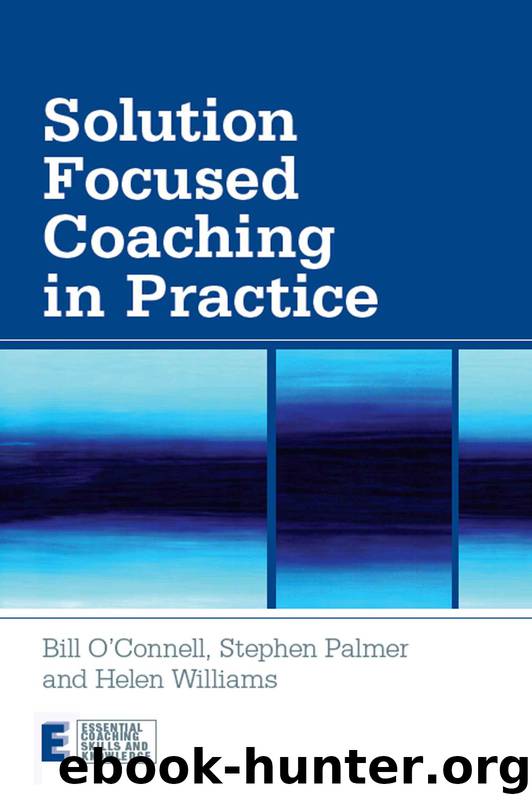Solution Focused Coaching in Practice (Essential Coaching Skills and Knowledge) by Bill O'Connell & Stephen Palmer & Helen Williams

Author:Bill O'Connell & Stephen Palmer & Helen Williams [O'Connell, Bill]
Language: eng
Format: mobi
Publisher: Taylor and Francis
Published: 2013-06-18T14:00:00+00:00
6
Group and team coaching
Solution focused coaching and the approach in general lends itself perfectly to group work and team development (McKergow and Clarke, 2005, 2007; Jackson and McKergow, 2007). The models and questions are simple yet effective, the emphasis is on positivity, inclusivity and empowerment, and the intention is to identify achievable, actionable step change. Whether you are bringing together a group of strangers or an established team, each individual should find solution focused coaching groups provide a supportive environment where it is easy to open up, talk freely about aspirations, recognise one’s own strengths and achievements as well as those of others, and realise one’s own and the team’s potential.
The solution focused approach is effective in group and team coaching for a number of reasons (see Bill O’Connell, 2005), as follows:
• In general, individuals are more willing to talk about their strengths in a group setting than they are about their weaknesses. The solution focused approach quickly establishes an air of openness, trust and empowerment.
• The focus on solutions (not problems) and simple steps, and on utilisation of all the resources within the group, naturally builds energy levels and commitment to action.
• Individuals within the group quickly develop solution focused skills that others can find extremely supportive. This may encourage the development of a wider solution focused climate and culture.
In his excellent book Solution Focused Groupwork, John Sharry (2007) describes how the solution focused approach is a ‘group-centred’ as opposed to ‘facilitator centred’ interaction (Sharry, 2007), emphasising the potential power of the group dynamic for peer coaching and learning; discussion develops amongst the group, with group members speaking directly to each other as opposed to speaking via the coach or facilitator. Sharry also warns of the potential for negative modelling within the group and the importance of encouraging group support (see Sharry, 2007).
Solution focused coaching approaches have been successfully adapted for use with groups across different contexts including business, education, social work and the health sector (O’Connell, 2005), providing a brief but effective group intervention for coaching (Hoskisson, 2003; Grant, 2003; Green et al., 2006; Spence and Grant, 2007; Green, Grant and Rynsaardt, 2007; Grant, 2008; Spence, Cavanagh and Grant, 2008; Yu, Collins, Cavanagh, White and Fairbrother, 2008; Grant, Curtayne and Burton, 2009). In this chapter we present solution focused coaching processes, models and activities for use in both group and team coaching.
Solution focused coaching models
The Reflecting Team model
A widely recognised process model for group solution focused coaching is the ‘Reflecting Team model,’ put forward by Harry Norman (Norman, 2003). Norman specifies a number of roles to be allocated within the group, namely that of presenter, process manager, time keeper and team member (Norman, 2003). Within the course of an SFC programme, each group member is given the opportunity to play each role. The presenter takes their turn to be the focus of attention and prepares to talk through the perceived problem, while the group listens to identify any resources and potential solutions the presenter might move forward with.
Download
This site does not store any files on its server. We only index and link to content provided by other sites. Please contact the content providers to delete copyright contents if any and email us, we'll remove relevant links or contents immediately.
Should I Stay or Should I Go? by Ramani Durvasula(6846)
Why We Sleep: Unlocking the Power of Sleep and Dreams by Matthew Walker(5698)
Fear by Osho(4114)
Flow by Mihaly Csikszentmihalyi(4092)
Why We Sleep by Matthew Walker(3809)
Rising Strong by Brene Brown(3807)
Too Much and Not the Mood by Durga Chew-Bose(3718)
How to Change Your Mind by Michael Pollan(3709)
The Hacking of the American Mind by Robert H. Lustig(3611)
Lost Connections by Johann Hari(3478)
He's Just Not That Into You by Greg Behrendt & Liz Tuccillo(3336)
Evolve Your Brain by Joe Dispenza(3082)
What If This Were Enough? by Heather Havrilesky(2961)
Resisting Happiness by Matthew Kelly(2908)
Crazy Is My Superpower by A.J. Mendez Brooks(2886)
The Courage to Be Disliked by Ichiro Kishimi & Fumitake Koga(2834)
The Book of Human Emotions by Tiffany Watt Smith(2795)
Descartes' Error by Antonio Damasio(2769)
In Cold Blood by Truman Capote(2711)
